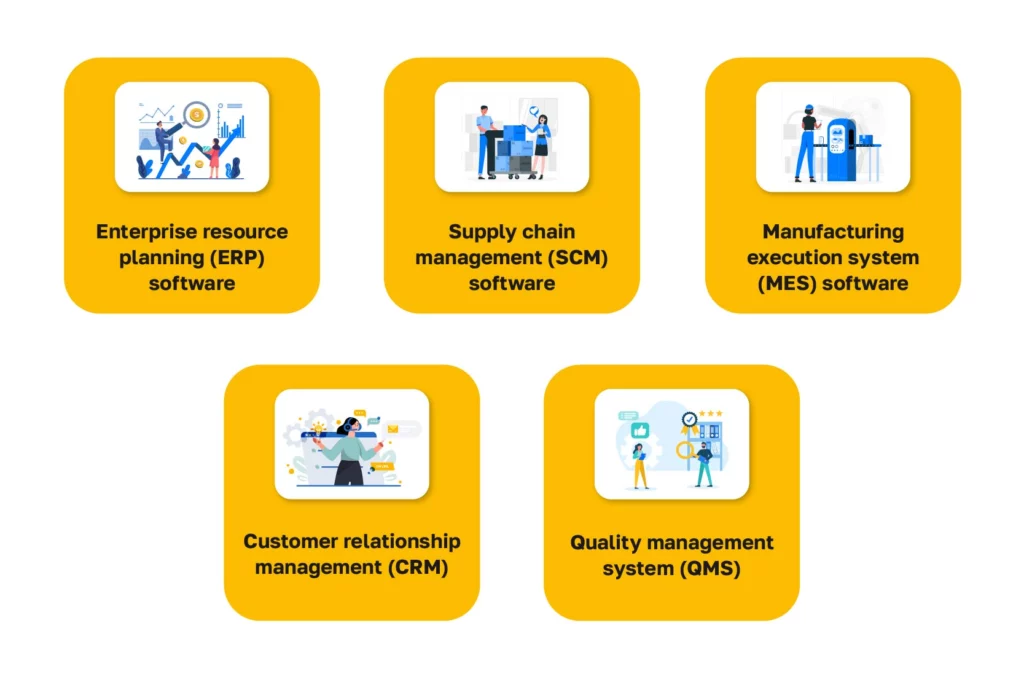Are you searching for groundbreaking software solutions to improve your manufacturing processes? Do you juggle multiple platforms and tools only to find that your production line still faces bottlenecks and inefficiencies? You might feel frustrated, knowing there must be a better way to operate.
With a blend of technological expertise and experience programming for manufacturing companies, we’re here to serve as your software development outsourcing guide through the different types of digital manufacturing solutions shaping the industry.
Table of Contents
What Is Manufacturing Software Development?
Manufacturing software development refers to designing, creating, implementing, and maintaining software solutions tailored for the manufacturing sector. These solutions are crafted to address the demands of manufacturing operations like production planning, inventory management, quality control, and supply chain optimization.
Some clear examples of manufacturing software include:
- A system that allows you to track the company’s inventory levels
- Sales forecasting applications
- Maintenance history tracking software
- Energy management equipment
- ERP software
What Are the Delivery Models for Manufacturing Software?
The choice of a delivery model impacts everything: cost, scalability, security, and even operational flexibility. Understanding each model’s distinct advantages and considerations can help manufacturers align their technology strategy with their business goals.
Below are three primary delivery models that are shaping the future of manufacturing software:
#1 – On-premises delivery model
This traditional approach involves installing the program directly on the company’s servers and computers. It offers the highest level of control over data and security, making it a preferred choice for organizations with stringent data protection requirements. However, it also entails a significant upfront investment in hardware, infrastructure, and ongoing maintenance costs.
#2 – Cloud-based delivery model
Cloud-based or Software as a Service (SaaS) solutions are hosted on the vendor’s servers and accessed via the Internet. This model eliminates the need for heavy initial investments and reduces the burden on in-house IT teams, as the vendor manages maintenance, updates, and security. The cloud model offers flexibility, allowing businesses to adjust their usage based on demand easily.
#3 – Hybrid delivery model
The hybrid model combines elements of both on-premises and cloud-based solutions, offering a balance between control and flexibility. It allows businesses to keep sensitive data on their servers while leveraging the cloud for scalability and cost-efficiency in less critical areas. This model is ideal if you meet specific regulatory requirements while benefiting from the cloud’s agility.

The 5 Most Demanded Types of Manufacturing Software
The challenge is to keep up with technological advancements while strategically integrating them into your operations. Among the various tools available, some have become very popular choices, each addressing crucial aspects of manufacturing. Understanding these trends and their benefits can empower manufacturers to optimize their processes and maintain a competitive edge.
Here are the five most in-demand manufacturing software types:
#1 – Enterprise resource planning (ERP) software
ERP systems serve as the technological backbone of a manufacturing operation, integrating various functions such as finance, HR, supply chain, and inventory management into a single, cohesive platform. This integration provides a unified view of the business, facilitating better decision-making. Modern ERP solutions are scalable and flexible, capable of adapting to evolving needs.
#2 – Supply chain management (SCM) software
An optimized supply chain is a critical component of success. SCM software provides the tools needed to efficiently manage the flow of goods and materials from suppliers to customers. Features like demand forecasting, inventory management, and supplier collaboration help manufacturers reduce costs, improve delivery times, and enhance overall supply chain visibility.
#3 – Manufacturing execution system (MES) software
MES software bridges the gap between planning and production, providing real-time monitoring and control over the manufacturing floor. It tracks all aspects of production, ensuring that products are manufactured efficiently, safely, and within quality specifications. Manufacturing execution systems enable continuous improvement and operational excellence by capturing detailed production data.
#4 – Customer relationship management (CRM)
While not exclusive to manufacturing, CRM systems are invaluable for managing interactions with customers and prospects. In manufacturing, CRM tools help align production with customer demand, manage sales orders, and enhance customer service. A robust CRM system can improve customer satisfaction, loyalty, and business growth.
#5 – Quality management system (QMS)
Quality is a non-negotiable in manufacturing, and QMS software ensures that products meet stringent industry standards and customer expectations. It automates critical quality processes such as document control, audits, non-conformance, and corrective and preventive actions (CAPA). By fostering a culture of continuous quality improvement, QMS software helps manufacturers reduce waste and avoid rework.

What Are the Essential Features of Manufacturing Software?
The key to effective manufacturing software lies in its features, which should address current needs while anticipating future requirements. Below are some of these critical features that can transform the way manufacturers operate, offering unprecedented levels of efficiency, insight, and adaptability:
Automation
At the heart of modern manufacturing programs is the ability to automate repetitive and time-consuming tasks. Automation extends beyond simple task execution to include complex workflows and production processes, reducing the potential for human error and freeing up valuable resources. This feature ensures that each manufacturing process step is executed with precision and efficiency.
Inventory management
Effective inventory management is crucial for minimizing waste, optimizing storage, and ensuring the timely availability of materials. Advanced inventory management system features provide real-time visibility into stock levels, track material usage, and forecast future inventory requirements. This capability helps reduce holding costs and avoid production delays caused by material shortages.
Reporting and analytics
Manufacturing software equipped with robust reporting tools can add vast amounts of data from various sources, offering actionable insights into operational performance, productivity, and areas for improvement. These insights enable manufacturers to make informed decisions, identify trends, and implement strategies to enhance efficiency and productivity.
Integration Capabilities
Manufacturing operations are part of a larger ecosystem of business processes and systems. The ability to integrate seamlessly with other programs, such as ERP, CRM, or supply chain management systems, is essential. Integration capabilities ensure that data flows freely between systems, providing a unified view of operations and eliminating data silos.
Scalability
Scalable manufacturing programs can adapt to changing business sizes, production volumes, and operational complexities without requiring a complete system overhaul. This flexibility allows manufacturers to add new functionalities, users, or production lines as needed, ensuring that the software continues to meet their needs as they expand and diversify.
How to Choose the Right Manufacturing Software for Your Business
Selecting the ideal software for your manufacturing company is a critical decision that can significantly impact your operational efficiency, product quality, and bottom line. This decision-making process involves careful consideration, evaluation, and alignment with your company’s strategic vision.
Here are three actionable steps to help you make an informed choice that will support your manufacturing operations both now and in the future:
Step 1: Assess your specific needs and objectives
The first step is identifying areas where software can make the most significant improvements. Consider factors such as production volume, operation complexity, and specific challenges like inventory management or quality control. Engage with stakeholders from various departments to understand their needs and pain points.
Step 2: Research and compare options
Look for systems specializing in your industry, as they’re more likely to include features pertinent to your specific challenges. Evaluate each option based on critical features, ease of use, compatibility with existing systems, and scalability. Also, consider the vendor’s reputation, customer support services, and the flexibility of their solution to adapt to future needs.
Step 3: Consider implementation and support
A smooth transition to the new program is essential to minimize disruptions to your operations. Inquire about the implementation timeline, training for your staff, and the support provided during and after the transition. It’s also important to discuss the system’s future roadmap to ensure it will continue to evolve with technological advancements and industry trends.

We Can Help You Build Custom Manufacturing Software!
Off-the-shelf manufacturing programs promise a one-size-fits-all remedy. However, the reality is that it can impose limitations that stifle a business’s unique processes and growth potential. Generic software may lack the flexibility to adapt to specific industry requirements, fail to integrate seamlessly with existing systems, or not scale efficiently as your business evolves.
This is where WillDom steps in with our software development outsourcing services. We understand your business has unique challenges, processes, and aspirations. Our approach is to collaborate closely with you, harnessing our deep industry expertise and cutting-edge technology to craft custom manufacturing software solutions tailored to your needs.
Contact WillDom today and partner with a team committed to delivering solutions that provide the agility to support your future growth!

